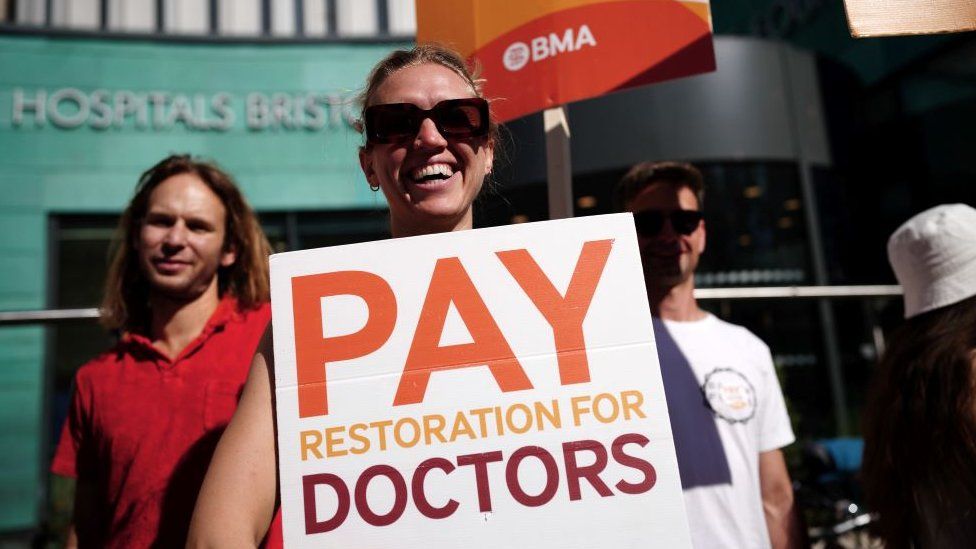NHS consultants reject latest pay offer
- Published

Consultants have rejected the latest pay offer from the government in England - by the narrowest of margins.
The British Medical Association urged ministers to better the deal, after 51% voted against it, with a 65% turnout.
The deal offered was worth an extra 4.95%, on average, in basic pay from this month - and would have come on top of the 6% rise granted in April.
Health Secretary Victoria Atkins said she was disappointed the "fair and reasonable" offer had been rejected.
"The government is carefully considering the next steps," she added.
Consultants staged four walkouts last year. They have a strike mandate until June but have yet to announce further action.
Those at the much smaller Hospital Consultants and Specialists Union also rejected the deal.
The amount individual doctors would have received, on top of the 6% rise already granted, would have varied from 0% to nearly 13%, as part of an overhaul of their contracts.
Nurses and other health workers ended their strike action after receiving a 5% rise and a one-off payment of £1,655.
And when the offer to consultants was made, last month, the Royal College of Nursing called it "galling".
BMA consultants leader Dr Vishal Sharma said: "The vote has shown that consultants do not feel the current offer goes far enough to end the current dispute and offer a long-term solution.
"It backs up conversations we've had with colleagues in recent weeks, who felt the changes were insufficient and did not give them confidence that pay erosion would be addressed over the coming years.
"In addition, they were concerned about the fairness of the offer and how it impacted different groups of doctors.
"There were also clear concerns about changes to professional development time, and time dedicated to teaching and research.
"However, with the result so close, the consultants committee is giving the government a chance to improve the offer."
The contract changes linked to the offer included:
ending one of the merit-awards systems that top up basic pay - so the rise would have cost the government only 3.45% more - which would have mostly affected younger consultants
streamlining the banding system - to ensure consultants spent less time at the bottom and rose to the top more quickly, which aimed to help those taking time out for childcare
The BMA had also agreed to stop pushing for premium rates of up to £269-an-hour for consultants to work overtime.
But the union's leadership then said the deal varied so much, depending on what stage of their career a doctor was at, it had been impossible to give a blanket recommendation.
Consultants had originally asked for an above-inflation pay rise this year - a figure above 11% had been floated - and a commitment to start restoring pay in future years.
Since 2008, pay levels had fallen significantly, once inflation was taken into account, the BMA had said.
Meanwhile, the BMA has announced junior doctors will be balloted to extend their strike mandate, which ends in February.
Talks with the government broke down in early December, prompting walkouts before Christmas and in the first week of January.
Are you waiting a long time for treatment on the NHS? Share your experiences by emailing haveyoursay@bbc.co.uk, external.
Please include a contact number if you are willing to speak to a BBC journalist. You can also get in touch in the following ways:
WhatsApp: +44 7756 165803
Tweet: @BBC_HaveYourSay, external
Please read our terms & conditions and privacy policy
If you are reading this page and can't see the form you will need to visit the mobile version of the BBC website to submit your question or comment or you can email us at HaveYourSay@bbc.co.uk, external. Please include your name, age and location with any submission.